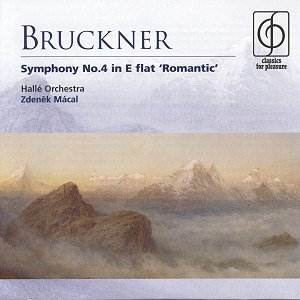Zdenek Mácal made a number of recordings for
the Classics for Pleasure bargain label in the early 1980s. You may
know his recording of Dvorakís "New World" Symphony with the
London Philharmonic complete with first movement exposition repeat that
many, myself included, consider one of the best ever made; quite an
achievement in a work so well known and recorded. His CFP recordings
coincided with the advent of digital recording too so he was well served
by the engineers. This recording of Brucknerís Fourth wasnít in the
catalogue long and, unlike the Dvorak, has never appeared on CD before,
so itís good to be able to get to know it again. For many this will
probably be a first acquaintance. It was made in the then home of the
Hallé Orchestra, the now demolished Free Trade Hall in Manchester,
and those who heard the Hallé at that time, as I often did, will
find the sound of both orchestra and hall bring back some fond memories.
The orchestra was in pretty good shape under Principal
Conductor Stanislav Skrowaczewski. In then circumstances Mácal
couldnít have been much better served had he recorded the Bruckner in
London though I do think the recording would have sounded different
and that would have been a pity. For example, we would have missed the
very distinctive no-nonsense brass sound thatís so well reproduced by
engineer Mike Clements (aka Mr. Bear). You might even say that this
is Bruckner with a Manchester accent: honest, straightforward and without
frills or fancy baggage. The brass section, for example, is not at all
the smooth and cultured underpinning chorus they so frequently are in
Bruckner recordings from Vienna, Amsterdam or Berlin. Rather the Hallé
produces a sound that seems as though itís rough hewn out of dark Pennine
stone, flinty and weather-beaten. This is encouraged further by the
recording balance that favours the brass over the strings, but not,
I must stress, to an extent that I found obtrusive. In fact I found
that it only added to my enjoyment of the performance, gave it a lot
of its character and appeal. Especially when added to Mácalís
reading of the score that I will deal with below. I certainly can think
of Brucknerians who will dislike this sound, indeed the whole "tone
of voice", that this recording gives of Brucknerís sound world.
But I would advise the curious to take the plunge and buy it. At this
bargain price you wonít be much out of pocket and you will gain a different
perspective on a work that you thought you knew.
Mácalís interpretation suits the sound that
his orchestra and engineers produce perfectly. In the first movement
we are certainly in those Pennine peaks so itís probably Salford rather
than Salzburg you can see through the mists and rains. The whiff of
fish and chip shops in your nostrils rather than schnitzel kitchens.
Mácal seems particularly keen to stress the wide contrasts in
the musical landscape from the depths of the valleys to the sharpest
heaven-storming peaks. He does this through a careful mapping of the
symphonic argument I found reminiscent of Klemperer whose EMI recording
should also be on the shelves of concerned Brucknerites, and an ability
to make each widely contrasting passage never appear detached from what
is to come and what has just gone. In the second movement he realises
the elegiac nature of much of the music and pays attention to the Andante
marking as well as any of the better-known interpreters. The main climax
later on in the movement is a genuine resolution but with the thread
never lost.
That distinctive North of England brass delivers real
gritty character in the Scherzo but the Trio has a nice line in meandering
charm. Then we are into the fourth movement, often a problem for Bruckner
where his inspiration can falter. Robert Simpson maintained that the
fourth movement of this work is let down by the secondary theme that
emerges a few minutes in. He even went so far as to describe it as a
"crackjaw platitude" that was trivial rather than naïve.
The implication being that in Bruckner the latter is acceptable where
the former isnít. I disagree and find the theme both trivial and naïve
in equal measure and what Bruckner does with it through the movement
rather convincing. True, the last movement of the Fourth is still not
the equal of that in the Fifth. There are a few passages where inexperience
haunts but Bruckner has come a long way in this department since the
Third. Mácal seems to agree too and presents the offending theme
honestly and without artifice and in that he helps the movement work
to a degree that is not really clear until the very end and you have
the chance to look back on it as a whole. At the very end Mácal
and his orchestra are superb in the way they build up the coda. This
is a point at which Brucknerís inspirational fires really do burst into
life to round off the whole work in a deeply satisfying way and here
the Hallé brass section roars out in triumph.
I suspect long takes were used at these recording sessions
and, if so, the impression of being at a "live" performance
that this produces only enhances my enjoyment of this very distinctive
and thoroughly recommendable version. At this price it comes into direct
competition with Georg Tintner on Naxos (8.554128). They are two profoundly
different interpretations. Tintner is grander and more atmospheric.
His tempi are more spacious also. But Mácal has more drama and
though his orchestra sounds less opulent and mellow than Tintnerís this
does, as I have tried to outline, carry gains. Try to hear both versions,
but I wouldnít be surprised if you ended up preferring Mácal.
Bruckner with a Manchester accent and none the worse
for that.
Tony Duggan


